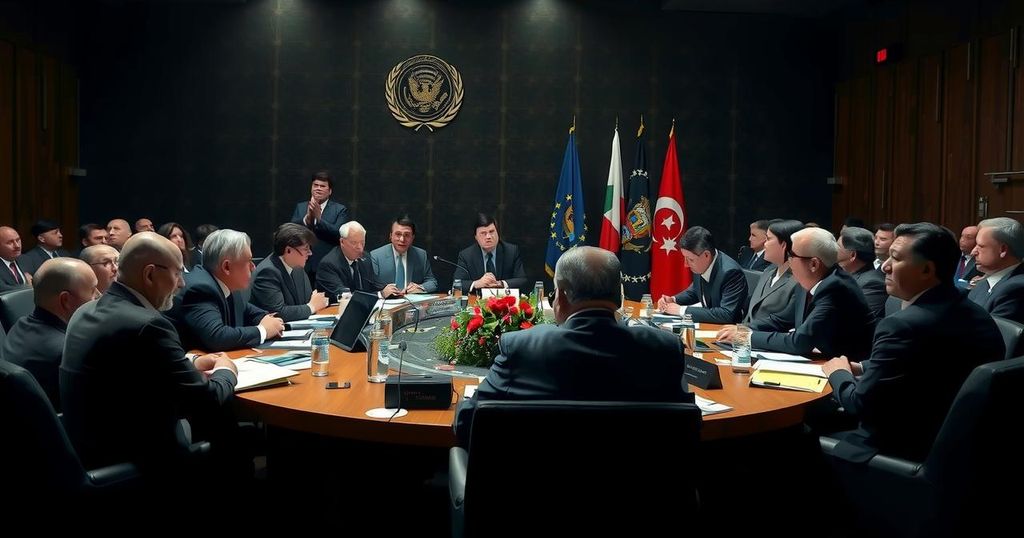COP29, commencing on November 11, 2024, in Baku, Azerbaijan, aims to establish a new global climate finance target while addressing climate change’s link to armed conflict. Azerbaijan’s presidency intends to present COP29 as the ‘COP of Peace,’ proposing initiatives to redirect climate finance to conflict-affected communities and establish a temporary truce during the conference. However, there are concerns regarding Azerbaijan’s motivations and the need for deeper discussions regarding military spending and emissions related to climate crises.
The upcoming UN climate change conference, COP29, is poised to take place in Baku, Azerbaijan, starting on 11 November 2024. Anticipated discussions will encompass a new collective climate finance target, following a pledge made by developed nations in 2009 to allocate $100 billion annually by 2020 to support developing nations in combating climate change. Although this target was met in 2022, there remains a pressing need for a renewed commitment from world leaders in light of the escalating climate crisis. One notable aspect of this conference is Azerbaijan’s aspiration to position COP29 as the ‘COP of Peace’. This initiative includes a Climate and Peace Initiative aimed at directing climate finance to communities impacted by armed conflicts. Additionally, Azerbaijan’s presidency has suggested a “COP truce,” encouraging warring factions to cease hostilities for the duration of the conference. This proposal seeks to highlight the detrimental relationship between conflicts and climate degradation, acknowledging that warfare exacerbates greenhouse gas emissions and environmental destruction. Despite welcome gestures for peace, civil society has approached these initiatives with caution, raising concerns that Azerbaijan may be attempting to ‘peacewash’ its historical actions and human rights record. Activists argue that temporary truces do not address the deeper systemic issues relating to militarism and its connection to climate breakdown. Essential dialogue around military emissions and expenditure must be integrated into the climate conversation to ensure meaningful progress. A true COP of peace would mandate transparency and accountability concerning military contributions to greenhouse gas emissions. Currently, military emissions reporting remains voluntary, allowing significant contributors, such as the world’s militaries, to evade serious scrutiny. Shockingly, studies indicate that militaries contribute roughly 5.5% of global emissions, substantially overshadowing the contribution of all African countries combined, which is only 4%. Therefore, a legitimate reform of military spending is necessary, redirecting funds towards climate finance and action, in order to effectively counter the looming threats posed by climate breakdown. As the world looks forward to COP29, it is crucial to remember the pressing nature of the climate crisis and the need for dedicated action. High military expenditures—amounting to $2.4 trillion in 2023—should be balanced with sustained investments in climate initiatives that support vulnerable communities. Emphasizing peace through climate justice requires a paradigm shift away from militarism. The time has come for world leaders to recognize that investing in peace means investing in the planet’s well-being.
COP29 is scheduled to occur in Baku, Azerbaijan, in November 2024, with significant discussions surrounding climate finance and national commitments to reduce emissions. The conference marks a notable moment as Azerbaijan seeks to redefine COP as a platform for peace, emphasizing initiatives that address both climate change and armed conflict. The interplay between militarism and climate degradation continues to be a contentious issue, prompting calls for comprehensive strategies that confront the role of military emissions and funding in the broader context of climate action.
In summary, COP29 presents a critical opportunity for world leaders to confront the intersections of climate change and militarism explicitly. By embracing policies that demand accountability from military sectors regarding emissions and reallocating military budgets towards climate initiatives, significant strides can be made towards a more sustainable future. Ensuring that peace efforts extend beyond symbolic gestures to include substantial commitments to climate justice will be essential in addressing the dual crises of our time.
Original Source: www.quaker.org.uk






